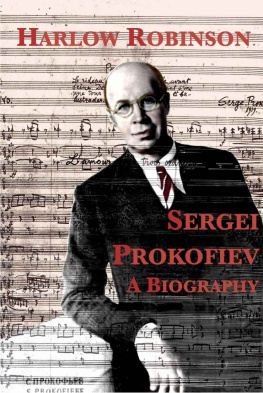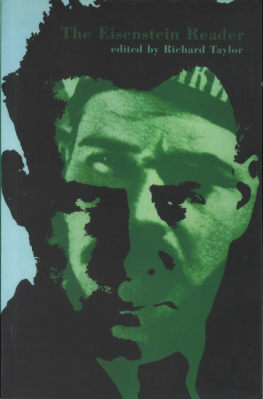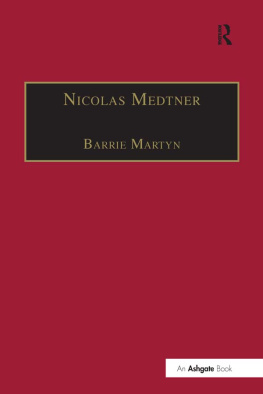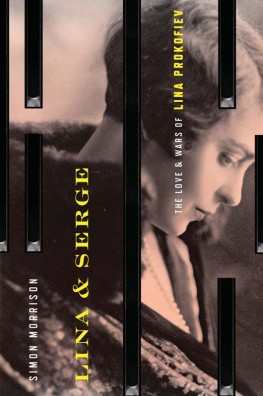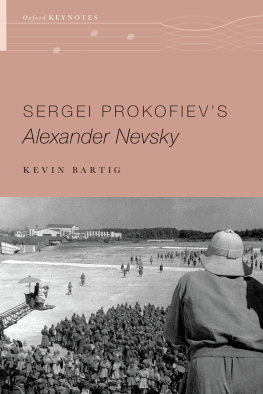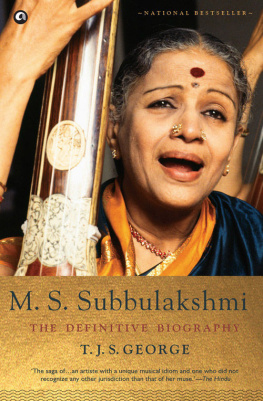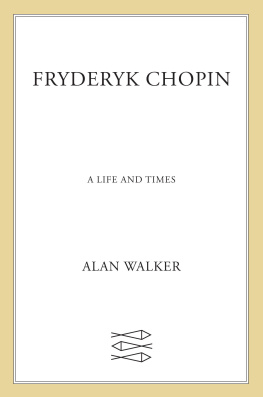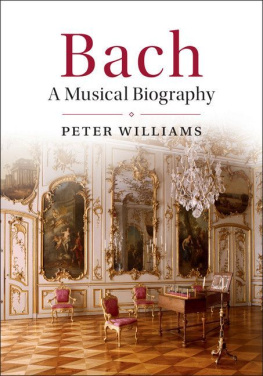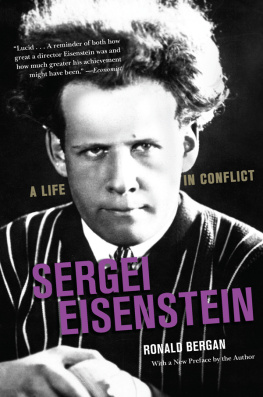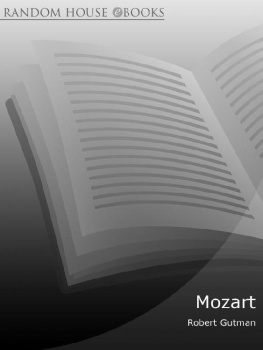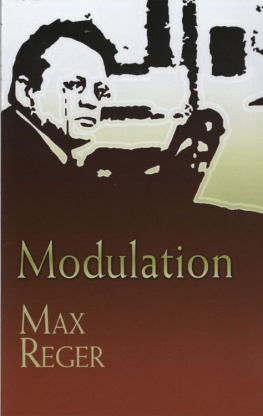Sergei Prokofiev
A Biography
by Harlow Robinson
Published by Plunkett Lake Press , December 2018
1987 by Harlow Robinson
Originally published in 1987 by Viking Penguin Inc.
Reprinted 2002 by Northeastern University Press.
Cover by Susan Erony
~ Other eBooks from Plunkett Lake Press ~
By Odile Ayral-Clause
Camille Claudel: A Life
By Carol Easton
Jacqueline du Pr : A Biography
By Amos Elon
Founder: A Portrait of the First Rothschild and His Time
Herzl
Jerusalem: City of Mirrors
By Helen Epstein
Joe Papp: An American Life
Meyer Schapiro: Portrait of an Art Historian
Miss DeLay: portrait of beloved violin teacher Dorothy DeLay
Music Talks: the lives of classical musicians
Tina Packer Builds A Theater
Writing from Life: On Trauma, Sexual Assault, and Recovery
By Raymond B. Fosdick
John D. Rockefeller, Jr.: A Portrait
By John Kenneth Galbraith
A Life in Our Times
By Howard Greenfeld
Ben Shahn: An Artist s Life
By Andy Grove
Swimming Across
By Sebastian Haffner
Churchill
Defying Hitler: A Memoir
The Meaning of Hitler
By Hans Heiberg
Ibsen: A Portrait of the Artist
By Anthony Heilbut
Exiled in Paradise: German Refugee Artists and Intellectuals in America from the 1930s to the Present
By Eva Hoffman
Lost in Translation
By Henrik Ibsen , translated by Rolf Fjelde
Pillars of Society, Rosmersholm, Little Eyolf, When We Dead Awaken
By George Jellinek
Callas: Portrait of a Prima Donna
By Peter Stephan Jungk
Franz Werfel: A Life in Prague, Vienna, and Hollywood
By Melvyn Leffler
A Preponderance of Power: National Security, the Truman Administration, and the Cold War
By Klaus Mann
The Turning Point: Thirty-Five Years in this Century, the Autobiography of Klaus Mann
By Jeffrey Mehlman
migr New York: French Intellectuals in Wartime Manhattan 1940-1944
By Junius Irving Scales and Richard Nickson
Cause at Heart: A Former Communist Remembers
By William Schack
Art and Argyrol: The Life and Career of Dr. Albert C. Barnes
By Stefan Zweig
The World of Yesterday
For more information, visit www.plunkettlakepress.com
CONTENTS
For my parents, and for Robert Holley
It s no misfortune to be born in a duck s nest from a swan s egg.
Sergei Prokofiev, The Ugly Duckling
(after the fairy tale by Hans Christian Andersen)
Foreword to the 2002 reissue
No matter who the subject is, biographies always reflect the times in which they are written. This one is no exception.
When I was researching and writing about the life and music of the Russian composer Sergei Prokofiev (1891-1953) in the late 1970s and early 1980s, the Cold War was still alive and raging. Not long after the Soviet invasion of Afghanistan in December 1979, President Carter announced an American boycott of the 1980 Moscow Olympics. At that moment, I was a graduate student in Moscow on a Fulbright grant, spending most of my days in the chilly reading room of the Soviet Central State Archives of Literature and Art, going through Prokofiev s manuscripts and papers for my doctoral dissertation on his operas. During President Ronald Reagan s first term in office, the ideological hostility between the United States and the Soviet Union only intensified. In November 1982, the Soviet Communist Party chief, Leonid Brezhnev, died and was replaced by the former KGB boss, Yuri Andropov. At that moment, too, I was in Moscow, now an assistant professor, but rummaging again (still!) through Prokofiev s archives and interviewing those who had known and worked with him in preparation for writing this biography. It should come as no surprise that some of these people were reluctant to take the risk of speaking frankly and openly to an American scholar although many of them did, sometimes requesting anonymity. Soon after Andropov came to power, a Korean Airlines passenger plane was shot down by Soviet aircraft near the island of Sakhalin and Reagan denounced the U.S.S.R. as the Evil Empire. Even Hollywood got into the act, producing such viciously anti-Soviet films as Red Dawn, in which matinee idol Patrick Swayze plays a high school jock leading guerilla resistance to a brutal Soviet invasion of a small Colorado town. That film appeared in 1984, the same year I was spending the summer in the reading rooms of Leningrad libraries in continued pursuit of Prokofiev.
I admit it: the otherness of Russia at the height of the Cold War was one of its main attractions for me. It was hard to get there and difficult to stay. If you studied Russian and Russian culture in those days, people assumed that you were either a Communist sympathizer or a spy in training. I was neither. Instead, I was obsessed with something else: the art and career of one of the greatest, and most enigmatic, composers of the twentieth century.
As it happens, my biography of Prokofiev appeared (in March 1987) at another crucial period in recent Russian history. About two years earlier, Mikhail Gorbachev had been named the new Communist Party First Secretary, and big changes were already afoot in Moscow. New slogans glasnost ( openness ) and perestroika ( restructuring ) were replacing rigid Communist propaganda, and Soviet artists and scholars were beginning to taste a freedom of expression they had not even dared to dream about. By the time I returned to Moscow in spring 1988, glasnost was in full bloom and the days of the old Soviet system were numbered. Prokofiev s official Soviet biographer, Israel Nestyev, who had since the Stalinist period been dutifully following the Party line in his many works on the composer and his music, even invited me to his apartment overlooking Gorky Street for drinks and zakuski. During our conversation, he let me know (somewhat apologetically) that he, like many others, was now reexamining his role in upholding the bankrupt ideology of a corrupt and inhumane system for so many years. In Nestyev s case, this meant denigrating the music Prokofiev wrote abroad before he returned to the bosom of mother Soviet Russia in the late 1930s. Although he dedicated most of his life to serious research on Prokofiev, as a young man Nestyev had also participated in writing some of the official attacks launched in 1948 against the alleged crime of formalism committed by Prokofiev and other composers.
The Soviet Union finally ceased officially to exist in late 1991, just a few months after the muted celebration of the hundredth anniversary of Prokofiev s birth the preceding April.
The Cold War may be over, but Cold War attitudes have continued to color Prokofiev s legacy and reputation. Like all prominent creative artists who lived and worked under the Soviet regime (including such figures as the composer Dmitri Shostakovich and the film director Sergei Eisenstein), Prokofiev came under new scrutiny for the extent to which he had collaborated with and supported what was now regarded as an evil and corrupt system. As is the case with all revolutions (and what happened in the Soviet Union in the late 1980s was surely a revolution, both cultural and political), all those associated with the old regime were now perceived as somehow tainted. Prokofiev came under attack for having enjoyed the privileged status of an officially approved (at least most of the time) artist in a totalitarian society the same status enjoyed by Richard Strauss in Nazi Germany. Once again, Prokofiev was castigated for his decision to leave Europe for the U.S.S.R. in the 1930s his ill-advised retreat from Paris to Moscow, as the New Yorker music critic Alex Ross wrote in his review of the Metropolitan Opera s brilliant new production of The Gambler in April 2001.
Next page
